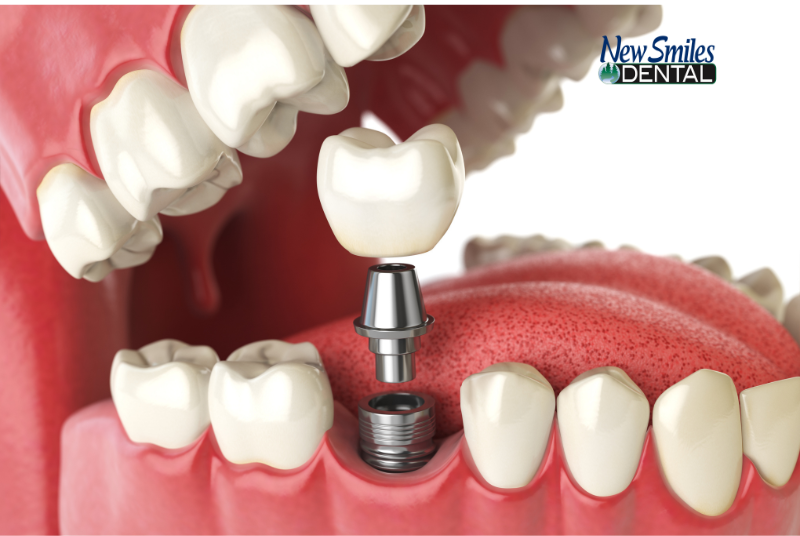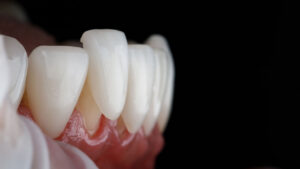Introduction
Welcome back to our blog series, “The Ultimate Guide to Dental Implants,” brought to you by New Smiles in Oregon. In our first post, we explored the basics of dental implants, including their definition, history, and the importance of guided surgery. In this post, we will delve into the various types of dental implants and their numerous benefits, helping you understand why they are an ideal choice for many patients.
Types of Dental Implants
- Single Implants
Single dental implants are ideal for patients missing one tooth. A titanium post is placed in the jawbone, and after it integrates with the bone, a custom-made crown is attached, restoring the appearance and function of your natural tooth.
- Implant Bridges
Implant bridges are used when several teeth are missing. Instead of replacing each tooth individually, implants are placed at strategic points, and a bridge is attached to these implants, filling the gaps seamlessly.
- Full Arch Implants
Full arch implants, also known as All-on-4, All-on-6 or All-on-X are used for patients who need a complete set of upper or lower teeth. Four or six implants are placed in the jaw, and a full arch of prosthetic teeth is attached, offering a stable and natural-looking solution. Our unique All-on-X technique using precision surgical guides, 3D printing the prosthetic, and attaching the teeth to the implants the day of the surgery has been coined “New Smile in a Day.”
- Surgical Techniques
Dental implant surgery has significantly improved over the last 40 years due to technological advancements. One incredible advancement is the use of surgical guides. In the past, dentists would place implants “free-handed”, meaning they make an educated guess at where the bone should be and then “eyeball” as they drill into the bone. Now, using Conebeam Computed Tomography (CBCT), digital impressions, and advanced planning software, we are able to create precise surgical guides to place implants with incredible accuracy. No more guessing. Few surgeons have the advanced training to use surgical guides accurately. When it comes to placing implants, look for a surgeon who uses guides to ensure accurate placement. New Smiles doctors are not only experts in these techniques but also train other surgeons throughout the nation.
- Materials: Titanium vs. Zirconia Implants
- Titanium Implants: Titanium is the most commonly used material for dental implants due to its biocompatibility and strength. It integrates well with the jawbone, providing a long-lasting foundation for replacement teeth.
- Zirconia Implants: Zirconia implants are a metal-free alternative made of ceramic material. They offer similar benefits as titanium implants and are ideal for patients who fear metal sensitivity. However, they are currently limited to replacing front teeth only.
- Specialized Implants: Mini, Pterygoid, and Zygomatic Implants
- Mini Implants: Smaller in diameter than traditional implants, mini implants are often used for patients with less bone density or narrow spaces. They are less invasive and require a shorter healing time. They are not as robust as traditional implants and have limited use.
- Pterygoid Implants: These implants are placed in the pterygoid plate of the sphenoid bone, providing support for dental prosthetics in the upper jaw without the need for bone grafting. They are used when other implant locations lack sufficient bone.
- Zygomatic Implants: Used for patients with severe bone loss in the upper jaw, zygomatic implants are anchored in the cheekbone (zygoma). They offer a stable solution when traditional implants are not feasible. These long implants are used as the “last options” due to their large complication risks.
Benefits of Dental Implants
- Aesthetics and Functionality
Dental implants closely mimic the appearance and function of natural teeth, allowing you to smile, eat, and speak confidently. They blend seamlessly with your existing teeth, providing a natural look.
- Durability and Longevity
With proper care, dental implants can last a lifetime. Unlike dentures or bridges, which may need replacements or repairs over time, implants offer a permanent solution.
- Improvement in Oral Health and Overall Well-being
Dental implants help maintain the structure of your jawbone, preventing bone loss and preserving facial integrity. They also improve your bite and chewing efficiency, improving digestion and overall health.
Conclusion
Stay tuned for our next blog post where we will cover the critical qualifications to look for in a dental implant doctor. This information will help ensure you choose the right professional for your dental implant procedure.
At New Smiles, we’re passionate about helping you achieve the smile of your dreams. If you have any questions or are considering dental implants, don’t hesitate to schedule a complimentary consultation with us. Let us guide you on your journey to a brighter, healthier smile!













